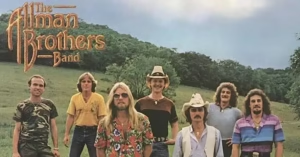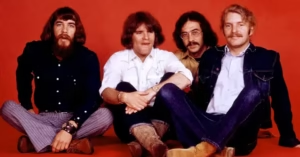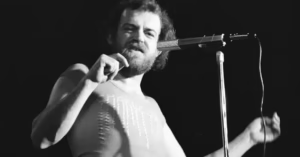Johnny Cash: The Man in Black and His Enduring Legacy
Johnny Cash. From Cotton Fields to Country Royalty
Johnny Cash, born J.R. Cash on February 26, 1932, in Kingsland, Arkansas, emerged from humble beginnings during the Great Depression. Raised in a working-class family of cotton farmers, Cash’s early experiences with hardship, faith, and the struggles of the American South would become central themes in his songwriting. After serving in the U.S. Air Force, he launched his musical career in 1955, signing with Sun Records alongside artists like Elvis Presley, Jerry Lee Lewis, and Carl Perkins—a cohort later dubbed the “Million Dollar Quartet.”
Johnny Cash. The Early Sound: Simplicity and Soul
Cash’s early recordings were stripped-down, raw, and hauntingly honest. With his deep baritone voice, minimalist “boom-chicka-boom” guitar rhythm, and stories of heartbreak, redemption, and rebellion, he forged a style that blurred the lines between country, gospel, blues, folk, and rockabilly.
🔹 Notable Early Hits:
- “Cry! Cry! Cry!” (1955)
- “Folsom Prison Blues” (1956) – Featuring the famous line, “I shot a man in Reno just to watch him die.”
- “I Walk the Line” (1956) – A massive hit showcasing Cash’s loyalty and musical ingenuity.
The Man in Black Persona
In the 1960s and 70s, Johnny Cash became known as “The Man in Black,” a nickname he embraced as a symbol of solidarity with the poor, prisoners, and those forgotten by society. He was deeply empathetic, a voice for the voiceless, often performing in prisons and addressing societal injustice.
🔹 “Man in Black” (1971)
In the titular song, Cash explains:
“I wear the black for the poor and the beaten down,
Living in the hopeless, hungry side of town.”
His performances at Folsom Prison (1968) and San Quentin (1969) remain two of the most iconic live albums in music history.
Johnny Cash. Struggles and Redemption
Despite his success, Cash battled with addiction to amphetamines and barbiturates, which strained his health and personal life. His erratic behavior in the mid-60s nearly derailed his career, but with the support of June Carter Cash, whom he married in 1968, he found spiritual and physical recovery.
June Carter, a member of the Carter Family, was his creative and emotional anchor. Their duet “Jackson” won a Grammy in 1968 and became emblematic of their fiery partnership.
Johnny Cash. A Cross-Genre Icon
Johnny Cash never allowed himself to be confined to one genre. He collaborated with:
- (notably on The Johnny Cash Show)
- Willie Nelson, Waylon Jennings, and Kris Kristofferson as part of The Highwaymen
- U2 on “The Wanderer” (1993)
He earned respect across the musical spectrum, from punk rockers to gospel traditionalists, and his rebellious image influenced artists in country, rock, folk, and beyond.
The American Recordings Era: A Triumphant Revival
In the 1990s, producer Rick Rubin helped resurrect Cash’s career with the minimalist and emotionally stark American Recordings series. Stripped of all excess, these albums focused on Cash’s voice, acoustic guitar, and soul-bearing lyrics.
🔹 Notable Tracks:
- “Hurt” (2002) – A haunting cover of Nine Inch Nails’ song that many view as Cash’s musical epitaph.
- “The Man Comes Around” – Apocalyptic and poetic, showcasing his late-era gravitas.
- “Rusty Cage,” “Personal Jesus” – Raw covers of modern rock classics made wholly his own.
Johnny Cash. Death and Legacy
Johnny Cash died on September 12, 2003, just four months after June’s passing. His final years were marked by pain and loss, but also critical acclaim and renewed public adoration.
Why Johnny Cash Still Matters
- Cultural Bridge: One of the few artists beloved by both conservative country fans and counterculture figures.
- Authenticity: His songs were grounded in moral conviction, empathy, and grit.
- Influence: Revered by generations of musicians from , Nick Cave, and Bob Dylan to Trent Reznor and Chris Cornell.
- Humanism: A voice of conscience, Cash advocated for prisoners’ rights, Native American issues, and spiritual introspection.
Essential Albums
| Year | Album | Highlights |
|---|---|---|
| 1956 | With His Hot and Blue Guitar | “I Walk the Line”, “Folsom Prison Blues” |
| 1968 | At Folsom Prison | “Cocaine Blues”, “Folsom Prison Blues” (Live) |
| 1969 | At San Quentin | “A Boy Named Sue” |
| 1971 | Man in Black | Title track |
| 1985 | Highwayman (with The Highwaymen) | “Highwayman” |
| 1994–2002 | American Recordings I–VI | “Hurt”, “The Man Comes Around” |
Band Members and Collaborators
- June Carter Cash – Vocals, wife, and frequent duet partner
- The Tennessee Three – Cash’s signature backing band
- Marshall Grant (bass)
- Luther Perkins (guitar)
- W.S. Holland (drums)
Honors and Recognition
- Country Music Hall of Fame (1980)
- Rock and Roll Hall of Fame (1992)
- Nashville Songwriters Hall of Fame
- Kennedy Center Honors
- Grammy Lifetime Achievement Award





